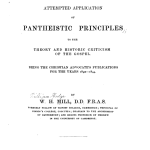
This is a series on Crucifixion, by Fleming Rutledge. (see part 1)
Here I would like to discuss Rutledge’s chapter on “The Godlessness of the Cross.” Her emphasis falls on the horror of the cross: “Most of us are conditioned to think of Jesus’ death as the scandal, when in fact it is not the death in itself, but the mode of death that creates the offense” (72). When she refers to the “godlessness” of the cross (paying especially tribute to Moltmann and Bonhoeffer on the subject), she means that the cross intrudes upon the expectations we have for the niceties of religiosity, worship, and liturgy. We expect religion to be “proper” and “formal” and “comfortable.” (As she notes later on, right now “spirituality” is “in,” but the cross would forever remain “out” if it had the stigma lingering from the first century.)
Rutledge very cleverly observes that the offense of crucifixion is not the suffering, but rather (quoting Susan Sontag) “suffering that degrades” (78). The Romans intended crucifixion to be de-humanizing: “declaring another person less than human is the well-attested first step towards eliminating that person, or that group of people” (80). As Rutledge notes, Origen referred to Jesus’ death as mors turpissima crucis – the utterly vile death of the cross.
The early part of this chapter is articulate and profound. Later, as she gets in the study of Galatians, I think things get a bit more murky. She relies heavily on Lou Martyn’s interpretation of Galatians, particularly an over-played negativity towards the Law and also a one-sided view of “Sin” as power rather than human choice (see 101). She even goes so far as to say “Sin in Paul is not something that one commit; it is a Power by which one is held helplessly in thrall” (101). I can’t see this worked out as an “either-or” in Paul’s letters.
In the next chapter, chapter 3, she will take up the topic of “The Question of Justice.” To be continued…











